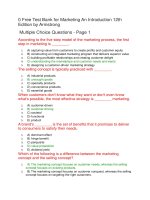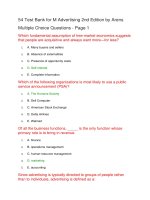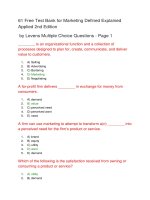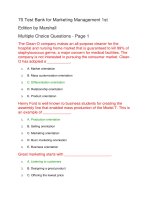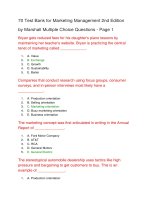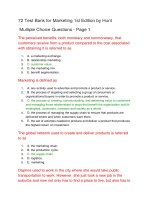74 test bank for marketing principles 2nd
Bạn đang xem bản rút gọn của tài liệu. Xem và tải ngay bản đầy đủ của tài liệu tại đây (103.08 KB, 19 trang )
74 Test Bank for Marketing Principles 2nd
Edition by Pride Multiple Choice Questions
Even funerals are changing as a result of customers’ needs and
wants. Some funeral companies are developing new products such
as:
1.
2.
3.
4.
A) less environmentally friendly coffins.
B) less economical funeral cars.
C) fewer cremation services.
D) cardboard coffins.
The expanded marketing mix includes:
1.
2.
3.
4.
A) product, price, place and promotion.
B) people, physical evidence, process and partnership.
C) people, promotion, place and process.
D) people, physical evidence, process and promotion.
Woolworths works with its primary producers and says they are
important partners in the marketing of Woolworths’ products. Their
primary producers play a key role in:
1.
2.
3.
4.
5.
A) the media.
B) unions and lobby groups.
C) product quality and packaging.
D) government.
E) the local community.
To maintain an exchange relationship, buyers must be satisfied with
the goods, service or idea obtained, and sellers must be satisfied
with:
1.
2.
3.
4.
5.
A) their profits.
B) receiving a good bargain on the product.
C) reducing their inventory.
D) one party having to compromise in the exchange.
E) the financial reward or something else of value received.
The focal point of all marketing activities is:
1.
2.
3.
4.
5.
A) products.
B) the marketing mix.
C) profits.
D) sales.
E) customers.
Consumers buying products online have dramatically affected the
__________ variable of the marketing mix.
1.
2.
3.
4.
5.
A) product
B) price
C) distribution
D) research
E) promotion
The concept of exchange is fundamental to the definition of
marketing. What is the best description of exchange?
1.
2.
A) Activities that are performed primarily by producers and manufacturers
B) Development of products, distribution channels, promotional strategies and
pricing objectives to satisfy customer requirements
3. C) Transfer of products in return for monetary considerations
4. D) Provision or transfer of goods, services or ideas in return for something of
value
5. E) Transfer of products that take place only between for-profit organisations
The marketing environment is best described as being:
1.
2.
3.
4.
5.
A) composed of controllable variables.
B) composed of variables independent of one another.
C) an indirect influence on the performance of marketing activities.
D) one that can fluctuate quickly and dramatically.
E) slow, with infrequent fluctuations.
Marketing is the process of:
1.
2.
3.
4.
5.
A) promoting products through personal selling and advertising to facilitate
satisfying exchange relationships.
B) maximising returns to stakeholders by developing relationships with valued
customers and creating an advantage for them.
C) delivering a standard of living to a society.
D) creating, distributing, promoting and pricing goods, services and ideas to
facilitate the achievement of a firm’s objectives.
E) focusing on customers’ needs.
For an exchange to occur, four conditions must exist: (1) two or
more individuals, groups or organisations must participate, and
each must possess ‘something of value’ that the other desires; (2)
the exchange must provide a benefit or satisfaction to both parties;
(3) each must have confidence in the promise of the ‘something of
value’ held by the other; and (4):
1.
2.
3.
A) the parties must agree to participate in the trading of ‘something of value’.
B) to build trust, parties to the exchange must meet expectations.
C) both parties must participate in the trading of ‘something of value’.
4.
5.
D) one party must be willing to compromise.
E) one party must have sufficient bank credit to finance the exchange.
The Ford Focus combines an economical vehicle with coordinated
distribution, promotion and price appropriate for the __________ of
primarily younger drivers who value technology, driving dynamics
and styling.
1.
2.
3.
4.
5.
A) target market
B) consumer advocates
C) marketing strategy
D) marketing mix
E) marketing tactic
The rising number of incidents of drink-driving in Australia has
prompted the Australian government to launch advertising
campaigns showcasing what can happen when driving under the
influence of alcohol. This calls for activity in which marketing mix
variable?
1.
2.
3.
4.
5.
A) Price
B) Promotion
C) Distribution
D) Product
E) Packaging
In the expanded marketing mix, which variable refers to the human
element of the product?
1.
2.
3.
4.
5.
A) Physical evidence
B) Processes
C) Promotion
D) People
E) Price
Those constituents who have a stake in some aspect of an
organisation’s products, operations, markets, industry and
outcomes are known as:
1.
2.
3.
4.
5.
A) shareholders.
B) stakeholders.
C) customers.
D) target markets.
E) marketers.
In Australia, Campbell’s responded to consumer concerns about
their health by introducing a line of reduced sodium soups made
with natural sea salt. This illustrates a change in the __________
for Campbell’s.
1.
2.
3.
4.
5.
A) marketing mix
B) marketing environment
C) marketing concept
D) marketing task
E) product concept
The Australian airline Jetstar Airways __________ its domestic
flights in Australia to people who want to fly to a destination without
having to pay for meals and other things that are not essential to
arriving at the destination safely and in good spirit.
1.
2.
3.
4.
A) arranges
B) prepares
C) provides
D) targets
Apple has benefitted from technological advances in distributing
songs over the Internet via its iTunes store, rather than establishingbrick and-mortar venues to sell music. This is an example of which
element of the marketing mix?
1.
2.
3.
4.
A) Price
B) Distribution
C) Product
D) Promotion
The application of human and/or mechanical efforts to people or
objects to provide intangible benefits to customers is:
1.
2.
3.
4.
A) a service.
B) a physical entity.
C) concepts, philosophies, images and issues.
D) a brand name.
Marketers sometimes speak of ‘controllable’ variables in the
practice of marketing. Which of these is not considered a
controllable variable?
1.
2.
3.
4.
5.
A) Product
B) Price
C) Distribution
D) Competition
E) Promotion
The definition of marketing implies that __________ should receive
benefits from exchange relationships.
1.
2.
3.
4.
5.
A) only customers
B) only businesses
C) company management
D) both customers and businesses
E) only the most important customers
Customer satisfaction can come from:
1.
2.
3.
4.
5.
A) lack of service.
B) the bulk and weight of the product being too great.
C) lack of process.
D) anything received when buying and using a product.
E) bad experiences.
The identified change in consumer behaviour towards online
shopping and/or searching for information can be described as a(n)
__________ force operating in the dynamic marketing
environment.
1.
2.
3.
4.
5.
A) competitive
B) economic
C) political
D) legal
E) sociocultural
Which of the following scenarios involves the distribution element of
the marketing mix?
1.
2.
A) Deciding whether a certain product should continue to be sold
B) Determining whether an advertising message would be more effective on
television or in magazines
3. C) Choosing between a company jet or an airline for executive travel
4. D) Deciding whether to have retail outlets in addition to a website
5. E) Developing a new warranty policy for an existing product
To Carlton & United Breweries, the maker of Foster’s Lager and
other products, the proposed increase in the drinking age in
Australia to 21 would be an example of:
1.
2.
3.
4.
5.
A) marketing mix.
B) marketing environment.
C) marketing concept.
D) marketing task.
E) product concept.
The marketing mix includes four marketing activities except which
of the following?
1.
A) Product
2.
3.
4.
5.
B) Price
C) Political forces
D) Promotion
E) Place
The product variable of the marketing mix can include all of the
following except:
1.
2.
3.
4.
5.
A) the creation of brand names.
B) consumer perception of the product price.
C) the development of product packaging.
D) warranty issues.
E) repair services.
The Australia Zoo in Queensland is in the business of:
1.
2.
3.
4.
A) establishing zoos.
B) making people happy and giving them memorable experiences.
C) making animals perform.
D) teaching about endangered animals.
A target market:
1.
2.
A) involves a large number of customers.
B) is a specific group of customers on whom a company focuses its marketing
efforts.
3. C) already has several competitors vying for customers’ business.
4. D) is the same thing as a salesperson’s prospective client list.
5. E) is a customer group classified as people with similar demographic
characteristics.
Responding to health concerns from consumers, McDonald’s
revamped its menu to include healthier children’s menu options,
such as fruit and chicken wraps instead of fries and hamburgers.
This is an example of marketing mangers responding to:
1.
2.
3.
4.
5.
A) an operating situation.
B) environmental forces.
C) the surroundings.
D) economic conditions.
E) the technological environment.
Which of the following statements about marketing environment
forces is not correct?
1.
A) They influence customers by affecting their lifestyles, standards of living,
and preferences and needs for products.
2. B) They may influence customers’ reactions to a firm’s marketing mix.
3. C) They fluctuate slowly and thereby create threats to a firm’s marketing mix.
4. D) They can fluctuate quickly and dramatically.
5.
E) They help determine whether and how a marketing manager can perform
certain marketing activities.
A physical product you can touch is a(n):
1.
2.
3.
4.
5.
A) service.
B) good.
C) idea.
D) concept.
E) philosophy.
The forces of the marketing environment include:
1.
2.
3.
4.
5.
A) political, legal and regulatory, sociocultural, technological, economic and
competitive forces.
B) sociocultural, legal, regulatory, economic and competitive forces.
C) legal, regulatory, political and sociocultural forces.
D) competitive and non-competitive forces that affect most lifestyles.
E) fairly static components.
The marketing concept is best defined as:
1.
2.
A) a second definition of marketing.
B) a philosophy stating that an organisation should try to satisfy customers’
needs through a coordinated set of activities that allows the organisation to
achieve its goals.
3. C) the performance of business activities that direct the flow of goods and
services from producer to customer or user.
4. D) a philosophy stating that an organisation should attempt to accomplish its
goals with no regard for the needs of customers.
5. E) the inclusion of marketing activities in the activities of an organisation.
Marketing managers strive to develop a marketing mix that:
1.
2.
3.
4.
5.
A) minimises marketing costs.
B) matches what competitors are offering.
C) best matches the abilities of the firm.
D) matches the needs of the target market.
E) generates the highest level sales.
For an exchange to take place, four conditions must exist. If you go
to a Coldplay concert, for example, you go with the expectation of a
great show. This is an example of the __________ condition, where
each party must have confidence in the promise of the ‘something
of value’ held by the other.
1.
2.
3.
4.
A) first
B) second
C) third
D) fourth
74 Free Test Bank for Marketing Principles 2nd
Australian Edition by Pride Multiple Choice Questions Page 2
Marketing activities:
1.
2.
3.
4.
A) are aimed at persuading customers through advertising.
B) involve mainly distribution and promotion decisions.
C) and selling activities are basically the same.
D) are important only when a firm is developing new products or entering new
markets.
5. E) help sell an organisation’s products and generate financial resources for
the firm.
Customer costs include anything the buyer must give up to obtain
the benefits the product provides. The most obvious customer cost
is:
1.
2.
3.
4.
5.
A) risk.
B) time.
C) monetary price.
D) effort.
E) availability.
__________ marketing plans hinges on coordination of marketing
activities, motivation of marketing personnel and effective
communication within the marketing unit.
1.
2.
3.
4.
5.
A) Implementing
B) Designing
C) Organising
D) Creating
E) Strategically planning
The marketing concept is:
1.
2.
3.
4.
5.
A) a managerial philosophy.
B) synonymous with exchange.
C) a component of the marketing mix.
D) a function of the marketing environment.
E) focused solely on satisfying customer objectives.
At the most basic level, profits can be obtained through
relationships in the following ways, except by:
1.
2.
3.
A) acquiring new customers.
B) enhancing the profitability of existing customers.
C) continually selling to only old customers and markets.
4.
D) extending the duration of customer relationships.
When Campbell’s introduced a line of low-sodium soups in
response to customer demand, it was following which of the
following philosophies?
1.
2.
3.
4.
5.
A) Selling concept
B) Production concept
C) Customer concept
D) Marketing concept
E) Retailing concept
Establishing long-term, mutually satisfying buyer–seller
relationships is known as:
1.
2.
3.
4.
5.
A) marketing synthesis.
B) relationship marketing.
C) a marketing orientation.
D) the marketing concept.
E) strategic marketing.
Which of the following would not be a customer cost considered in
determining product value?
1.
2.
3.
4.
5.
A) A product’s purchase price
B) Time spent purchasing the product
C) Effort spent purchasing the product
D) Benefits received in the exchange for the products
E) Risk of purchasing the product
When new products – such as Lyrica, a treatment for fibromyalgia
(nerve) pain – are developed, companies must develop marketing
activities to reach prescribing medical doctors and communicate the
products’ benefits and side effects. Thus, the marketing concept
emphasises that marketing begins and ends with:
1.
2.
3.
4.
5.
A) customers.
B) marketing managers.
C) the CEO.
D) the finance department.
E) nurses.
Customer benefits include __________ a buyer receives in an
exchange.
1.
2.
3.
4.
A) the product
B) the service
C) the value
D) anything
For most firms, the costs of marketing activities consume
approximately what portion of the consumer’s dollar?
1.
2.
3.
4.
5.
A) One-half
B) One-fifth
C) One-fourth
D) One-third
E) One-sixth
Amazon, the online provider of books, music, movies, toys and
many other products, follows buyers’ purchases and recommends
related topics. The firm is exhibiting characteristics associated with
the ________ orientation.
1.
2.
3.
4.
5.
A) production
B) sales
C) marketing
D) social
E) development
All of the following are marketing management tasks except:
1.
2.
3.
4.
5.
A) planning.
B) implementing.
C) organising.
D) analysing target markets.
E) controlling.
Which element of the marketing mix can be used to enhance
perceptions of value through images?
1.
2.
3.
4.
5.
A) Product
B) Price
C) Place
D) Promotion
E) People
Customer relationship management focuses on using __________
about customers to create marketing strategies.
1.
2.
3.
4.
5.
A) internal communications
B) information
C) purchasing power insights
D) marketing mix knowledge
E) implementation knowledge
The strategic bridge between information technology and marketing
strategies aimed at long-term relationships is known as:
1.
2.
3.
4.
5.
A) personal selling.
B) customer relationship management.
C) production oriented firms.
D) e-marketing.
E) distribution channels.
As the Industrial Revolution came during the second half of the
nineteenth century, firms operated in a(n) __________ orientation.
1.
2.
3.
4.
5.
A) marketing
B) societal
C) sales
D) evolutionary
E) production
The marketing concept focuses on:
1.
2.
3.
4.
5.
A) achieving the goals of top executives.
B) creating maximum visibility for the firm.
C) maximising sales.
D) maximising market share.
E) customer analysis, competitor analysis and integration of the company’s
resources to provide customer value and to make the organisation more
valuable for its owners and other stakeholders.
__________ is a customer’s subjective assessment of benefits
relative to costs in determining the worth of a product.
1.
2.
3.
4.
5.
A) Marketing orientation
B) Monetary price
C) Product assessment
D) Price assessment
E) Value
Today’s society could be described as post-industrial and in the
middle of a _________ revolution.
1.
2.
3.
4.
5.
A) customer driven
B) research-and-development
C) technological
D) slow growth
E) marketing
__________ is the process of establishing performance standards,
comparing actual performance with established standards and
reducing the difference between desired and actual performance.
1.
2.
3.
A) Internal control analysis
B) Marketing control
C) Market flow regulation
4.
5.
D) Environmental market analysis
E) External analysis
A marketing orientation is an organisation-wide effort that includes
all of the following activities except:
1.
2.
3.
4.
5.
A) researching customers’ needs.
B) focusing on the marketing department only.
C) generating marketing intelligence for use in the organisation.
D) being responsive to customers’ ever-changing wants and needs.
E) disseminating marketing intelligence across departments within the
organisation.
A systematic process of assessing opportunities and resources,
determining marketing objectives and developing a marketing
strategy and plans for implementation and control describes which
of marketing management activity?
1.
2.
3.
4.
5.
A) Strategic planning
B) Marketing control
C) Implementation
D) Organising
E) Planning
Marketing management is defined as a process of:
1.
2.
A) maintaining an appropriate and efficient marketing mix for a target market.
B) establishing performance standards and evaluating actual performances
against these standards.
3. C) providing products that satisfy customers’ needs through a coordinated set
of activities.
4. D) facilitating satisfying exchanges between an organisation and its
customers.
5. E) planning, organising, implementing and controlling marketing activities to
facilitate exchanges effectively and efficiently.
The hard-sell days of the 1950s saw ‘vacuum cleaner salesmen’
arriving at front doors with a charming smile and a product
demonstration that would ‘make life easier’ for housewives. Which
orientation were they following?
1.
2.
3.
4.
5.
A) Production
B) Sales
C) Marketing
D) Customer
E) Societal
Green marketing is:
1.
A) a strategic process involving stakeholder assessment to create meaningful
long-term relationships with customers while maintaining, supporting and
enhancing the natural environment.
2. B) when a company applies recycling principles in their production.
3. C) when a company only uses the Internet to advertise and has no paperbased activities.
4. D) when a company meets legislative requirements for waste management.
The marketing concept is a philosophy that states that an
organisation should try to satisfy customers’ needs and:
1.
2.
3.
4.
5.
A) increase market share.
B) increase sales.
C) achieve the organisation’s goals.
D) produce high-quality products.
E) coordinate its activities to increase production.
Marketing knowledge and skills:
1.
2.
A) are not necessary for a non-profit organisation.
B) enhance consumer awareness and help provide people with satisfying
goods and services.
3. C) constitute the marketing mix.
4. D) were most important during the production era.
5. E) are most valuable for advertising executives but less important for
wholesalers and distributors.
The marketing concept is not a second definition of marketing; it is
a marketing philosophy guiding:
1.
2.
3.
4.
5.
A) marketing activities.
B) an organisation’s overall activities.
C) the efforts of sales personnel.
D) customer relations.
E) only business organisations.
Marketing activities are:
1.
2.
3.
4.
5.
A) used by organisations of all sizes, including non-profit organisations and
government agencies.
B) limited to use by larger for-profit and non-profit organisations.
C) implemented only to increase profits for the organisation and to expand the
scope of its customer base.
D) used by all types and sizes of businesses, except non-profit organisations.
E) used mostly by small businesses and small non-profit organisations.
A mid-level manager has tried for years to get his company to adopt
a marketing orientation. Although many in the company are
receptive to his ideas, it is unlikely that the company will ever truly
become marketing-oriented without:
1.
2.
3.
4.
5.
A) the support of competitors.
B) changes in government regulations.
C) increases in tariffs on foreign products.
D) the support of executives, managers, and customers.
E) the consent of assembly-line workers.
According to the marketing concept, an organisation should try:
1.
2.
3.
4.
5.
A) to consider short-run objectives and cash flow needs before developing
new products.
B) to define its business as ‘making a product’.
C) to provide products that satisfy customers’ needs and allow the
organisation to achieve its goals.
D) to put most of its emphasis on marketing activities and be less concerned
with finance, accounting and personnel.
E) to view selling activities as the major means of increasing profits.
The evolution of the marketing concept has moved from a
production orientation in the 1850s to a(n) __________ orientation
today.
1.
2.
3.
4.
5.
A) sales
B) market
C) customer
D) relationship
E) economic
Existing key trends that will likely continue in the future include the
following except:
1.
2.
3.
A) the convergence of telecommunications, media and technology.
B) greater focus on protecting the environment.
C) the focus on quality, long-term customer relationships to increase
profitability in the long term.
4. D) technology enabling consumers to connect and form alliances with other
consumers worldwide.
5. E) greater false advertising.
How does marketing fuel the global economy?
1.
2.
3.
4.
5.
A) Profits are put towards developing new products and technologies.
B) Lack of profits results in lower standards of living.
C) There is a decrease in economic growth.
D) Only local acceptance of brands occurs.
E) No one buys local brands anymore.
As a concept, customer relationship management begins its focus
on customers with:
1.
A) information.
2.
3.
4.
5.
B) product.
C) distribution.
D) communication.
E) price.
In today’s market environment, you might pay $16 for a new album
on iTunes. According to the text, approximately how much of that
price would go to activities related to marketing (e.g. distribution,
retailer expenses, profit margins)?
1.
2.
3.
4.
5.
A) $2.00
B) $4.00
C) $5.00
D) $9.00
E) $13.00
What type of guarantee do many eBay-based businesses use to
reduce the risk involved in ordering merchandise sight unseen?
1.
2.
3.
4.
5.
A) Photographs
B) Customer satisfaction ratings
C) Email contacts
D) 100 per cent satisfaction guarantee
E) Monetary price
Businesspeople who believe that personal selling, advertising and
distribution are the most important marketing activities are operating
in a(n) __________ orientation.
1.
2.
3.
4.
5.
A) marketing
B) societal
C) sales
D) evolutionary
E) production
